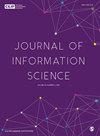The effect of digital literacy on technology acceptance: An evaluation on administrative staff in higher education
IF 1.7
4区 管理学
Q3 COMPUTER SCIENCE, INFORMATION SYSTEMS
引用次数: 1
Abstract
Digital literacy is a critical skill that administrative staff must acquire to continue their business activities at higher education. However, digital literacy studies for administrative staff seem to be neglected in the current literature. This article examines the impact of higher education administrative staff’s digital literacy on their intention to use digital technologies while performing their tasks. For this purpose, a conceptual model consisting of effort expectancy and performance expectancy structures based on the unified theory of acceptance and use of technology and expanded with the digital literacy dimension has been created. Data were collected from 158 participants who were administrative staff of two higher education institutions in Türkiye to evaluate the theoretical model. The data were analysed using the structural equation modelling technique. The findings revealed the relationship between the digital literacy skills of higher education administrative staff and their intention to use digital technology. According to the results, digital literacy has a direct effect on effort expectancy but not on performance expectancy. Also, contrary to our expectations, digital literacy does not directly affect the intention to use. However, digital literacy affects the intention to use digital technology through effort expectancy and performance expectancy. In higher education, personnel with low digital literacy skills should be identified and in-service training should be provided. This is one of the first studies to address the impact of digital literacy on technology acceptance by administrative staff working in higher education.数字素养对技术接受的影响:对高等教育行政管理人员的评价
数字素养是行政人员在高等教育中继续从事商业活动所必须掌握的一项关键技能。然而,在当前的文献中,针对行政人员的数字素养研究似乎被忽视了。本文考察了高等教育行政人员的数字素养对他们在执行任务时使用数字技术的意图的影响。为此,建立了一个概念模型,该模型由基于接受和使用技术的统一理论的努力预期和绩效预期结构组成,并随着数字素养的维度而扩展。数据收集自158名参与者,他们是土耳其两所高等教育机构的行政人员,以评估理论模型。使用结构方程建模技术对数据进行了分析。研究结果揭示了高等教育行政人员的数字素养与他们使用数字技术的意愿之间的关系。根据研究结果,数字素养对努力预期有直接影响,但对表现预期没有直接影响。此外,与我们的预期相反,数字素养不会直接影响使用意愿。然而,数字素养通过努力预期和绩效预期影响使用数字技术的意愿。在高等教育中,应确定数字素养低的人员,并提供在职培训。这是首批研究数字素养对高等教育行政人员接受技术的影响的研究之一。
本文章由计算机程序翻译,如有差异,请以英文原文为准。
求助全文
约1分钟内获得全文
求助全文
来源期刊

Journal of Information Science
工程技术-计算机:信息系统
CiteScore
6.80
自引率
8.30%
发文量
121
审稿时长
4 months
期刊介绍:
The Journal of Information Science is a peer-reviewed international journal of high repute covering topics of interest to all those researching and working in the sciences of information and knowledge management. The Editors welcome material on any aspect of information science theory, policy, application or practice that will advance thinking in the field.
 求助内容:
求助内容: 应助结果提醒方式:
应助结果提醒方式:


